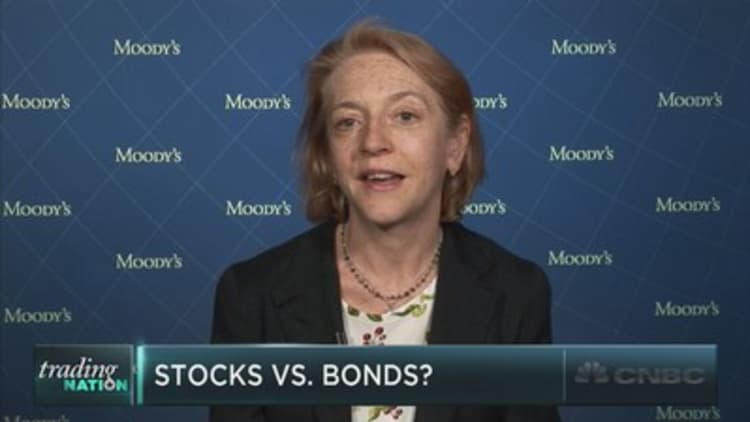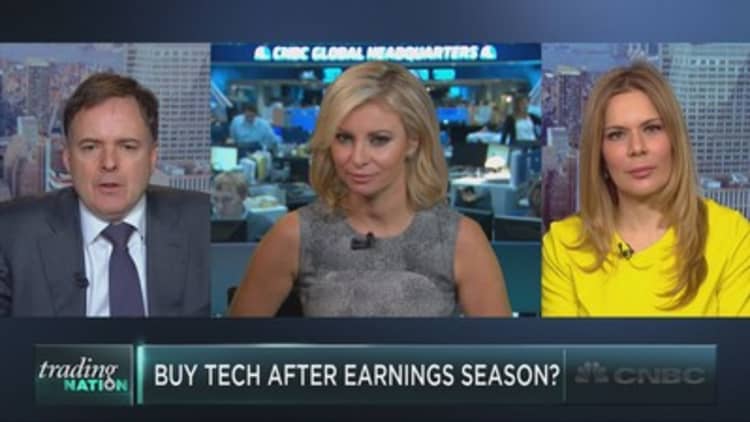


Companies that obsessively buy back their shares could be making a big mistake, says one Moody's analyst. In fact, it may be time for corporate managers to rethink the popular buybacks and dividend hikes that improve the share price of a company without doing anything for its long-term prospects, she says.
"You have to expect that there's an inherent conflict between creditors and equityholders when it comes to share buybacks," said Christina Padgett, the head of leveraged finance at credit-rating firm Moody's, in a Wednesday interview.
Both stockholders and bondholders "believe in the long term success of the company, but there are certain benefits that go to the shareholder directly in the form of a buyback or a dividend that actually don't support future growth of the company, and so really don't inure to the benefit of creditors."
Dividends and buybacks are different ways of directly returning cash to shareholders that have the same effect in practice, supporting the stock price in the short-term (all else being equal). And both have become extremely popular maneuvers of late.
Buybacks by S&P 500 companies rose to $219 billion in the first quarter, the highest since the fourth quarter of 2007, according to TrimTabs. Meanwhile, S&P 500 corporate dividends rose to a new record of $376 billion in 2014, according to FactSet.
A recent example of a stock-boosting move came two weeks ago, when General Electric announced that it would sell off most of its GE Capital business, and buy back as much of $50 billion worth of its stock. The shares surged, but Moody's downgraded the company's debt, noting in a press release that "The downgrade reflects our perception of a growing level of financial risk tolerance, in favor of equity holders and at the expense of creditors."
Read More Stock-boosting maneuvers stoke bondholder concern
Of course, corporate default rates have been extremely low of late, which might argue that these maneuvers are well within companies' means. But Moody's Padgett sees the problem as a broader one.
"I'd like to believe that defaults are still a long way off," she said. "But my concern would be—if you think about how a company should position itself for further growth, you want to think of them as taking the cash they do have and using it to invest in something that generates growth."
And there is another problem with the buybacks specifically: Stocks do not look cheap.
"If you think about the stock market today, it feels fairly overvalued," Padgett said. "So you see a lot of companies buying back their shares at relatively high valuation, instead of taking that money and putting it into something more growth oriented."
So what will end these stock-boosting, but potentially destructive, trends?
"I think you have seen a lot in the press lately about what might not be that constructive about shareholder activism," she said. "And maybe that will, in turn, motivate CEOs to think twice about the balance that they try to project between credit and equity."
But to Erin Gibbs, equity chief investment officer at S&P Capital IQ, it's up to investors to strike that balance for themselves.
"There's a reason why the most basic asset allocation for assets is between equities and credit," Gibbs wrote to CNBC. "Of course the interests aren't aligned, the goals of the assets classes are different. Credit is to provide income and protect the losses on your initial investment. Equities are for mostly for price appreciation and some income."
As long as companies can continue to protect bondholders' investments while creating price appreciation for shareholders, then, perhaps the stock-boosting trend is not such a negative one.
Want to be part of the Trading Nation? If you'd like to call into our live Monday show, email your name, number and question to TradingNation@cnbc.com.






